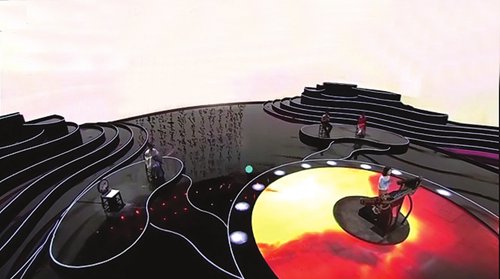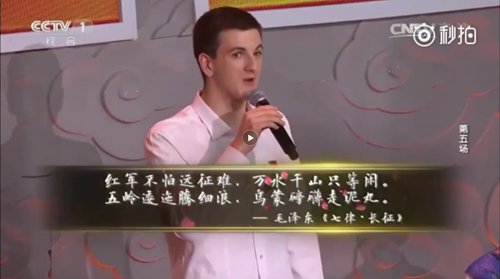For more on this tv show, see http://www.globaltimes.cn/content/1032000.shtml — Kirk
Source: Global Times (2/15/17)
Popular game show on ancient Chinese poetry hints at return of traditional culture
By Zhang Yuchen

A scene from Chinese Poetry Conference
Game show Chinese Poetry Conference, which just completed its second season on China Central Television (CCTV), has brought ancient Chinese poetry back into the public spotlight.The literary talent of the show’s host, competitors and panel of experts wowed audiences in China, reigniting the nation’s passion for ancient Chinese poetry.
Competitors from all different walks of life took the stage on the show, even including some foreign competitors.
Foreign impact
Dylan Walker, a student from the US, recited a seven-word poem by Mao Zedong on the show. Talking about Mao’s poem, Wu said the poetic description of the Long March set his heart afire. He also explained how Tang Dynasty (618-907) poet Li Bai’s “In The Silence Of Night” first moved him and inspired him to learn ancient Chinese poetry on his own.

Dylan Walker appears on the second season of game show Chinese Poetry Conference.
In recent years, the appearance of culture-themed TV programs have inspired a wave of foreign students to start learning about traditional Chinese culture or even come to China.
“TV shows like Poetry Conference can help accelerate the spread of ancient Chinese poetry overseas, even though it is still hard for our foreign friends to understand the Chinese language,” Kang Zhen, a professor at Beijing Normal University and one of the show’s judges, told the Global Times on Tuesday.
Back at the beginning of the 20th century, Chinese scholars such as Wen Yiduo first began translating ancient Chinese poetry into English so it could be introduced abroad. In 1915, US poet and literary critic Ezra Pound published Cathay, a collection of 19 classical Chinese poems translated into English that is widely considered the first introduction of Chinese poetry traditions to the Western modernist school of poetry.
Since China’s opening-up and reform during the 1980s, cultural projects have sprung up overseas while an increasing amount of translators have published translations of ancient classics.
For instance, Xu Yuanchong translated more than 100 classics into both English and French. In 2014, he became the first Asian to win the “Aurora Borealis” Prize at the 20th International Federation of Translators. His 300 of China’s Immortal Poems was published by Penguin in 1994 in Britain, the US, Canada, Australia and other countries. This was the first time that the well-known British book company published a Chinese translation.
Culture renaissance?
This is not the first time a cultural TV program has captured the public’s attention. As early as 2001, CCTV’s Lecture Room, a program that invited scholars to give live lectures on their areas of expertise, made some scholars such as Yi Zhongtian, Yu Dan and Meng Man – also a judge on the poetry game show – extremely popular.
Additionally, shows such as Chinese Characters Dictation Conference, Chinese Idioms Conference and Chinese Riddles Conference all kicked off fads dedicated to traditional Chinese culture.
But each time, these fads faded away after a short time.
So how will the traditional culture wave kicked off by Chinese Poetry Conference fare?
According to data from CCTV, the number of viewers of the 10-episode first season of Chinese Poetry Conference reached 1.16 billion. The show currently holds a score of 8.5/10 on Chinese media review site Douban.
Meanwhile, another culture-themed TV program, Letters Alive, the Chinese version of Britain’s Letters Live, also has a high score of 9/10.
The bloom of cultural programming at the start of Chinese New Year has made many netizens wonder if traditional Chinese culture is about to experience a “spring” renaissance.
In Kang’s opinion, this new craze isn’t bringing back passion for traditional Chinese culture, rather it is merely revealing a passion that already exists.
“Even if without Chinese Poetry Conference, China still has more than 1 million poetry enthusiasts. The success of the show is a reflection that Chinese civilization is rooted deep in people’s hearts,” Kang said.
Wang Liqun, one of the four judges on Chinese Poetry Conference, called the success of the show a “rebuff” of the “fun first” rule that is widely followed by most entertainment shows.
“Television channels currently believe in a ‘fun first’ rule that has led to celebrities dominating most variety shows. Chinese Poetry Conference, by contrast, invited ordinary, talented and knowledgeable participants, which is a fresh breeze for the entertainment industry,” Wang wrote in a post on his personal blog.